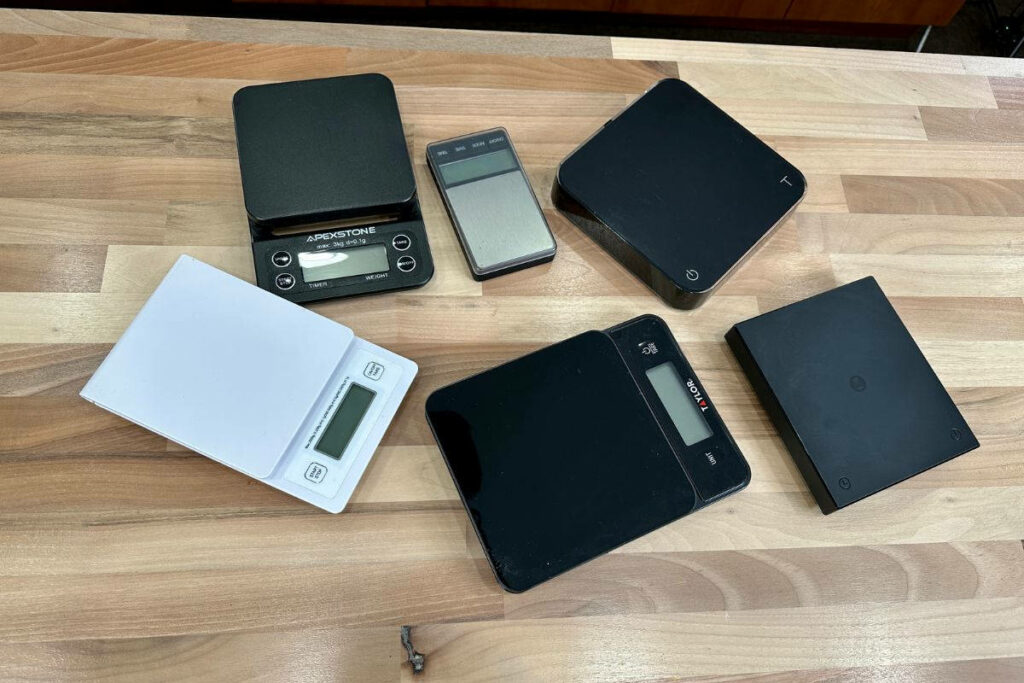
Every coffee enthusiast knows precision and consistency are important to a perfect brew. This means having the right tools. And when it comes to measuring the optimal coffee-to-water ratio, the coffee scale is one of the top tools.
After trying many scales, my all-around favorite scale is the Timemore Black Mirror. It is accurate, responsive, and includes nice features at a reasonable price.
If you want something simple, the Apexstone is a great workhorse on a budget. If you want the absolute best, get the Acaia Pearl, which is the Apple of coffee scales with a beautiful design and unmatched responsiveness.
Today, I’ll cover all the best coffee scales and how I tested everything so you make the best decision and take control of the brewing process.
Why Should You Use A Coffee Scale?
You should use a coffee scale for precision and repeatability. In other words, the flavor of your coffee depends on the coffee-to-water ratio you use. The exact coffee-to-water ratio depends on the brew method you use, but for each method, you need to measure the beans and water to get the ratio right.
When I tested coffee scales, there were three main criteria:
- Accuracy: does the scale give an accurate weight? I used a weight kit to ensure the scales all matched the weight kit.
- Responsiveness: how quickly does the scale get to its weight? This is important as some scales can have a significant lag, where the weight can change by 2g between stopping a pour and the final reading. That can alter your final shot.
- Ease of use: what features does the scale have? Measurements to a tenth of a gram and a timer are most important, but some scales have lots of bells and whistles (some helpful and some not).
You can see the testing in our video:
Overall, a coffee scale is a must-have tool whether you want to experiment or reproduce the same coffee-to-water ratio every day. I’ll give more detail on the criteria, but first, here are the top picks.
Individual Reviews: Best Coffee Scale
| Image | Product Name | Features | Price |
|---|---|---|---|
Best Quality 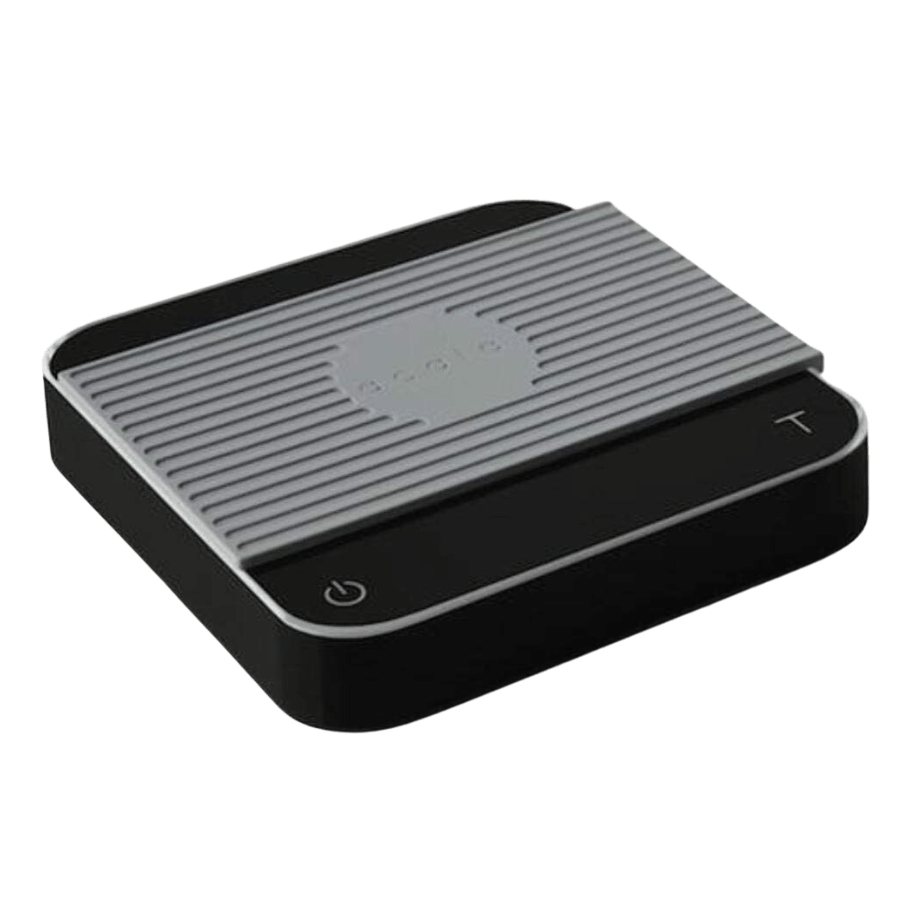 |
| Check AmazonCheck Seattle Coffee Gear | |
Budget Pick (works great) 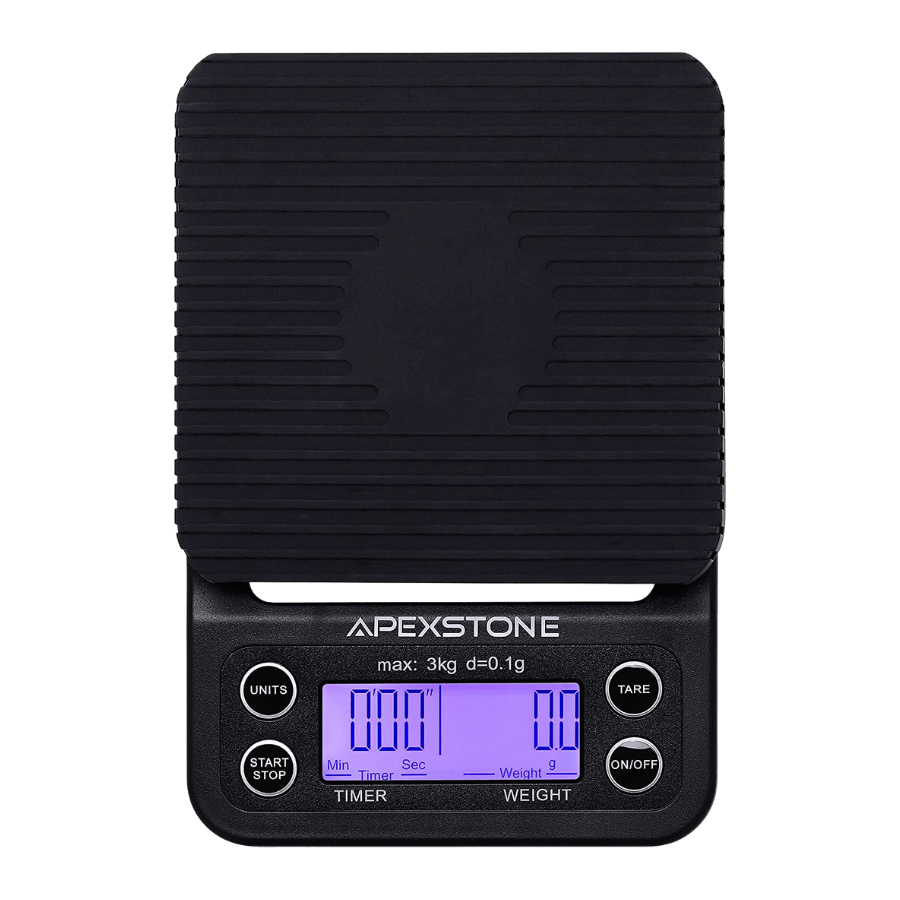 |
| Check Amazon | |
Top Pick 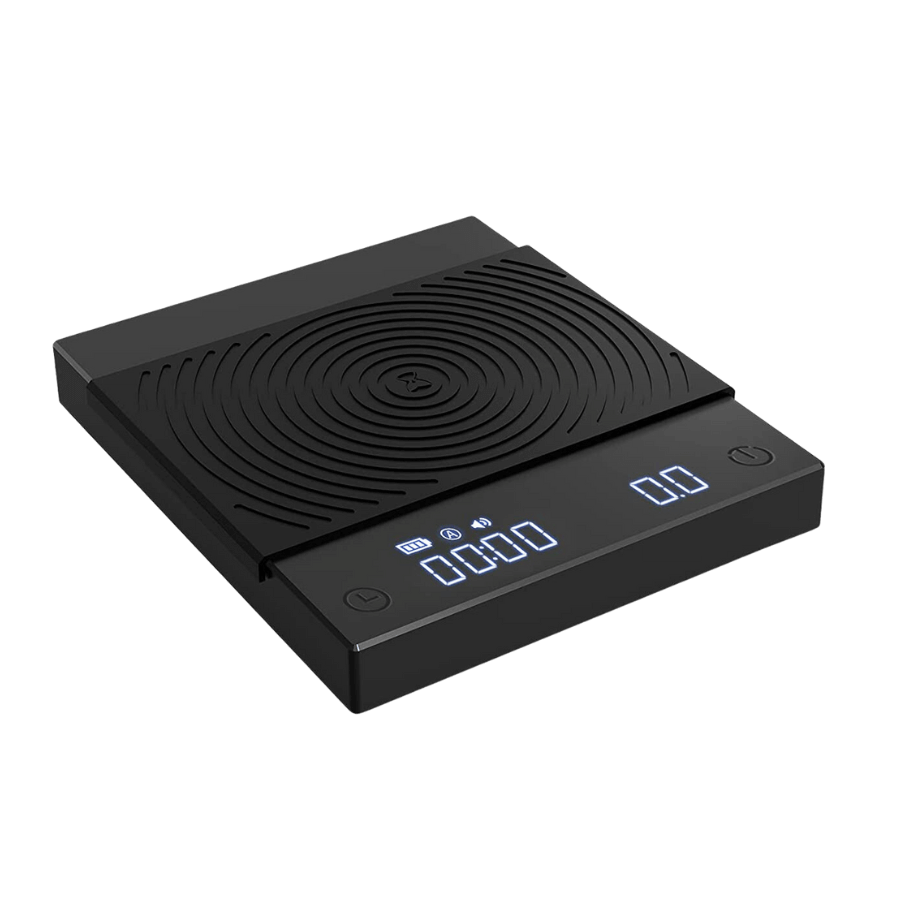 |
| Check Amazon | |
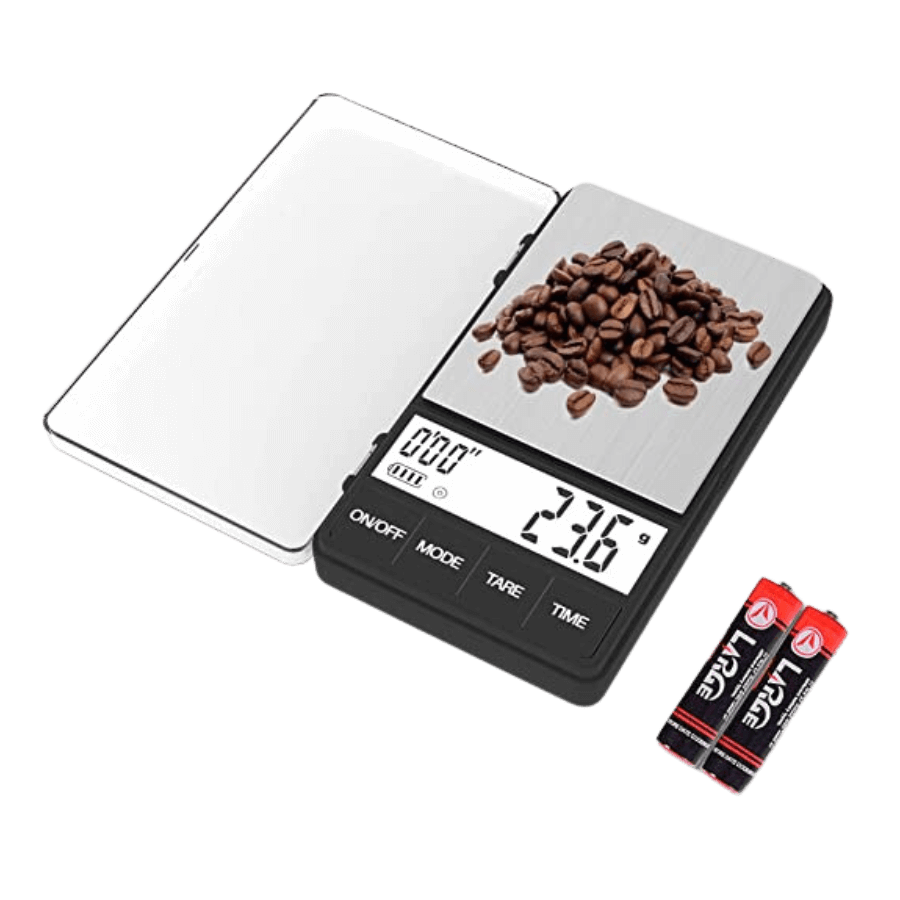 |
| Check Amazon | |
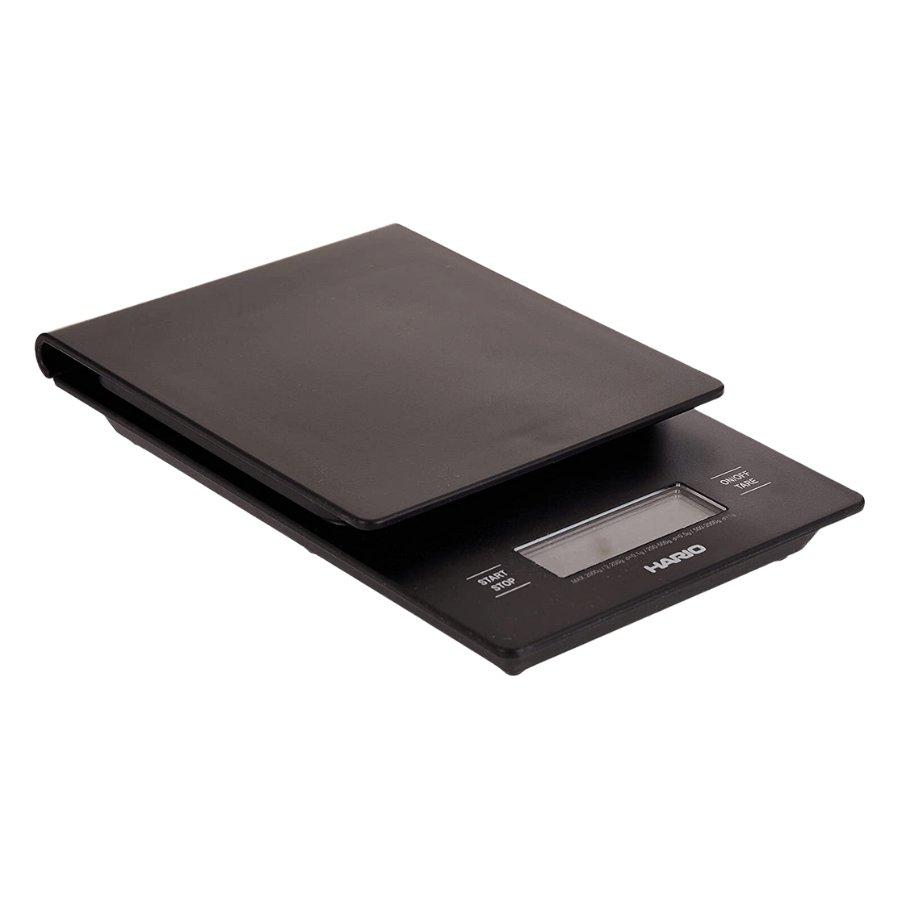 |
| Check AmazonCheck Seattle Coffee Gear | |
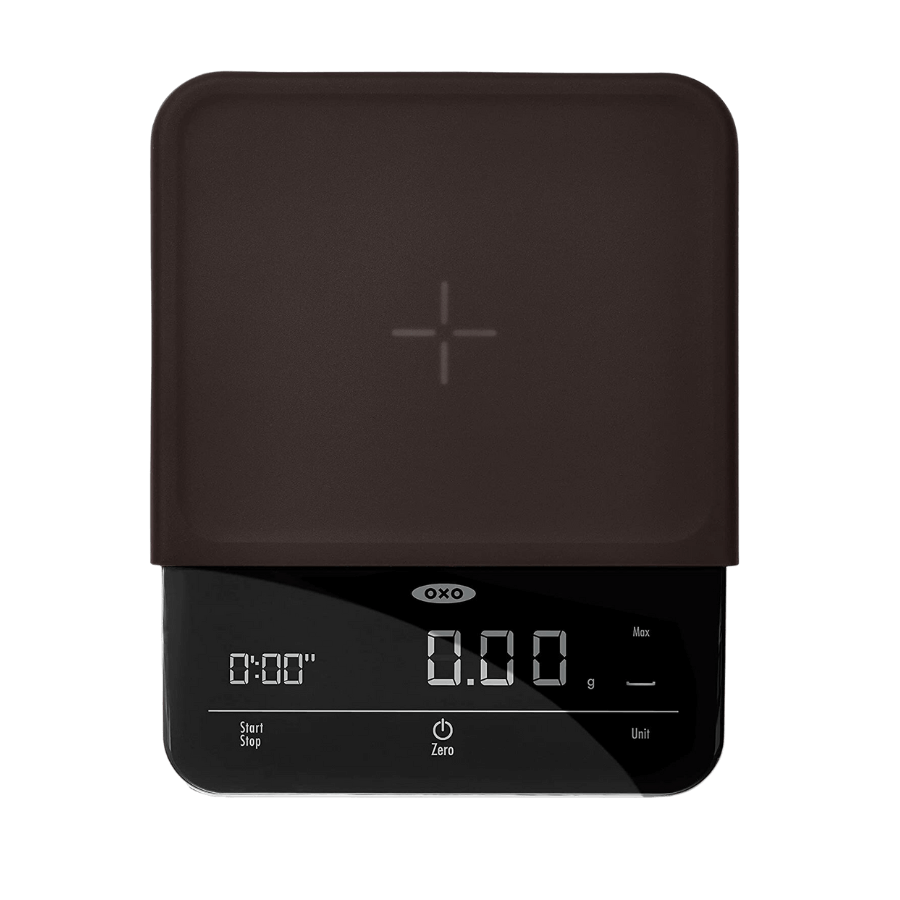 |
| Check AmazonCheck Seattle Coffee Gear |
1. Acaia Pearl

Acaia Pearl highlights:
- Size: 6.3 in x 6.3 in x 1.25 in
- Responsiveness: High
- Other: Bluetooth connectivity
Acaia coffee scales are the cream of the crop of the coffee scale world, and the Pearl is seen by many as the best digital coffee scale on the market. Everything about the Pearl is high-end. It looks futuristic and modern, has a minimalistic design, and has touch-sensitive buttons.
This scale can measure in ounces and grams, displays measurements to .1 of a gram, and has fast readings of 20 ms. In other words, it even picks up the evaporation of your brew. You’ll notice a drop of .1 gram as a hot drink dissipates, which is remarkably precise.
Overall, I love how responsive and small it is, and its Apple-like design is extremely attractive. The laboratory-grade scale technology is extremely accurate, and it picks up on the most minute changes in flow. It’ll stop within 0.2 grams when I stop pouring, reducing the risk of missing my 1:15 ratio.
Moreover, the Pearl is a smart scale. It has Bluetooth connectivity, so you can connect it to not one but two phone apps that give you extra features. For example, record your recipes, get instructions on complex brew processes, and auto-ratio your bean-to-water measurements. In reality, I didn’t use the apps much (except to turn off the sound), and the average coffee consumer doesn’t need this. Then again, the Acaia Peral is designed for those who take coffee very seriously.
On the con side, the Pearl isn’t waterproof, which means if you spill, you risk ruining all its smart technology. It’s fairly water-resistant, though, and normal coffee spills will be fine. The scale charges via USB, and I found the charge lasts ages.
The scale even monitors flow rates as you brew. However, I found the flow rate not very intuitive. The Acaia uses an expanding set of dots to show the flow rate, which is difficult to track. Also, I don’t think there’s much need for Bluetooth connectivity for an average user.
2. Apexstone

Apexstone highlights:
- Size: 7.5 x 5.2 x 1.1 in
- Responsiveness: Medium
- Other: Measures in five units
Apexstone coffee scale is completely different from the Pearl. Most importantly, this scale is much more affordable. In fact, it’s the second most affordable coffee scale on this list. However, a low price doesn’t mean low performance.
Apexstone measures in five different units. Its max weight is 3,000 g, and it measures up to .1 g. It has a silicone mat, which keeps the scale protected from heat and spilled liquids. I could easily remove the mat and clean it as needed between uses.
This is a coffee scale with a timer, which is great considering its affordable price. You can time the brew and get a consistent cup every time. The scale times up to one hour. There’s no trade-off in accuracy here, as it matched or beat the more expensive scales on a simple weight test to measure 100 grams.
I really like that the weighing platform is separate from the buttons, which makes it easy to push the buttons without distorting the scale. Apexstone also has an LCD display with a blue backlight. It’s easy to read, and it shows:
- Switch function
- Timer
- Low battery indicator
- Tare function
- Auto-off function
The main downside of the Apexstone is its slow responsiveness. The weight can change by 2 grams from when you stop pouring. That is a big gap, and you’ll have to get used to stopping the espresso pour a second faster than you need to. That’s what you pay for, but I also got used to this pretty quickly.
For a French press, this scale is perfect as it’s large enough to fit a full carafe, and you don’t need to be extreme responsiveness here. Just something that tells you the accurate weight, which this does well.
Lastly, it uses two AAA batteries. This is a con, but I’ve changed the batteries once in two years of use, so it’s a small issue.
3. Timemore Black Mirror

Timemore Black Mirror highlights:
- Size: 6 x 5.1 x 1 in
- Responsiveness: High
- Other: Only measures in grams
Timemore Black Mirror is a solid coffee scale with an attractive design that resembles the modern Acaia scales but is more affordable. It’s larger than the Pearl but compact enough to fit on an espresso machine drip tray. You can use it for both espresso and pour-over. I liked its design and the display that isn’t noticeable when not in use, which is a nice touch.
The scale is very accurate and responsive. It’s a great option that gets close to the Acaia in design and functionality but at a much lower price.
I also like the flow rate monitor, which displays grams per second above the weight. It’s very easy to read and nice to make sure your pour over speed is consistent, which helps keep for an even extraction. There is also an auto-start timer that begins when water first hits the scale. This is also really nice for accurately timing your filter coffee or French press.
You charge the Black Mirror with a USB-C, so there’s no need to change batteries. The scale is water resistant and accurate to .1 g.
One downside of the TimeMore Black Mirror is it’s very sensitive to your touch. Because the buttons are connected to the weighing mechanism as one piece, any press of a button will affect the weight. You can easily add 100 grams by pressing the side of the scale. That can lead to issues, but the tare button works after you lift your finger, so it’s always accurate as long as you don’t press it against anything.
Also, the Black Mirror doesn’t have any Bluetooth connectivity. Essentially, Timemore Black Mirror does two things: weighs coffee and times your brews, but it does them well.
Note: This scale only measures grams, not ounces.
Overall, if you’re looking for a reliable coffee scale with a timer that can be used on various brew methods, this is a strong contender.
4. Weightman Espresso Scale

Weightman Espresso Scale highlights:
- Size: 4.8 x 2.7 x 0.7 in
- Responsiveness: Medium
- Other: Extremely affordable
If you’re looking for an espresso scale with a timer, Weightman is a great choice. It’s too small to be used for pour-overs, but it’s a perfect size for espresso. It’s slim enough to fit easily on a drip tray, even if you have a compact coffee maker.
While its responsiveness doesn’t match the Pearl, it’s pretty fast and accurate. You can choose between grams and ounces, and the backlit LCD display is easy to read. Also, the weighing mechanism is separate from the buttons, which makes it easy to press without distorting the scale.
One downside is the scale doesn’t fit a portafilter. I wish the cover would come off so it could lay on top of the scale and hold a portafilter. This change alone would put the Weightman in my top picks.
The build quality feels somewhat cheaper compared to the scales above, but it’s just as durable as anything else on this list. There’s no reason why this scale shouldn’t last a while. It even comes with a plastic cover, which is easy to fold up so you can take the scale on trips.
The Weightman has accuracy readings of .1 g and a maximum capacity of 1000 g. It even has a timer function, which is a big plus considering its affordability. You can easily fit it under your Flair or Breville coffee maker and keep track of the coffee brewing time.
5. Hario Drip Scale

Hario Drip Scale highlights:
- Size: 7.4 x 4.7 x 1.1 in
- Responsiveness: Medium
- Other: Measures both volume and pour time
In case you didn’t guess already, the Hario Drip scale is made for brewing drip coffee. This coffee scale is slim and precise. However, it’s too large to be placed on an espresso machine drip tray, which means it’s not the best coffee scale for espresso.
Hario Drip scape measures from .1 g with an accuracy of +/- 0.2 error margin, which is more than decent. There’s an LCD display between the timer and the weight, which is easy to read. However, the screen doesn’t have any more functionality than a basic weight and time with no other units or functions.
Also, the responsiveness is poor, as something the first half gram goes unregistered before the scale suddenly jumps up to over a gram. It takes a second or more to get to the final reading. You need to add the coffee beans slowly, or you risk going over the amount of coffee you want.
It has an auto-off feature that kicks in after five minutes of unused, touch-sensitive buttons and a timer. Once the timer is activated, the auto–off feature doesn’t work until you turn it off yourself, which is a nice touch from Hario.
It’s powered by two AAA batteries which have a decent life thanks to the auto-off feature, but USB charging would have been better. Also, this scale isn’t waterproof
The coffee scale has three accuracy levels:
- 2 g to 200 g — Measures in 0.1 g intervals
- 200 g to 500 g — Measures in 0.5 g intervals
- Above 500 g — Measures in 1 g intervals
This incremental increase works well when you brew coffee, but it’s not ideal for precisely weighing espresso. For example, if you were to add a portafilter to the coffee scale, it would probably surpass the 200 g threshold, so you can’t measure the .1 g for espresso.
Overall, the Hario feels like the Apexstone but is more expensive with less functionality. I would go with the Apexstone.
6. OXO Brew

OXO Brew highlights:
- Size: 1.5 x 7.7 x 10.7 in
- Responsiveness: Medium
- Other: Large enough to fit a Chemex
Oxo Brew scale is optimized for brewing pour-over coffee but can double as a general kitchen scale. It measures units in grams, ounces, and pounds. This scale for brewing coffee has a simple interface with a brightly lit display that’s easy to read. It’s equipped with a built-in timer which times up to ten minutes. The start/stop timer button is located on the left, and the middle has a zero function you use to auto-tare the scale. The button to switch between the measuring units is located on the right.
This scale uses four AAA batteries and enters standby mode after five minutes of unuse. It automatically turns off after half an hour, which saves battery life.
The coffee scale measures in .1 intervals, with measurements from 0.5 g to 6 lb, which makes it better for pour-over coffee brewing than espresso. I found the readings fast and precise.
Finally, it has a silicone sleeve which provides a nice grip and keeps the digital coffee scale safe from heat and scratches.
This is a simple scale for coffee, but nice if you want to use a scale that doubles for food prep at a good price.
What to Consider When Buying Coffee Scales
Accuracy
Accuracy and precision are the most crucial things to look for in coffee scales. For example, some scales won’t measure less than 1 g. But if you’re a coffee geek and want to have exactly 8.53 g of coffee, you need a scale that’s more precise.
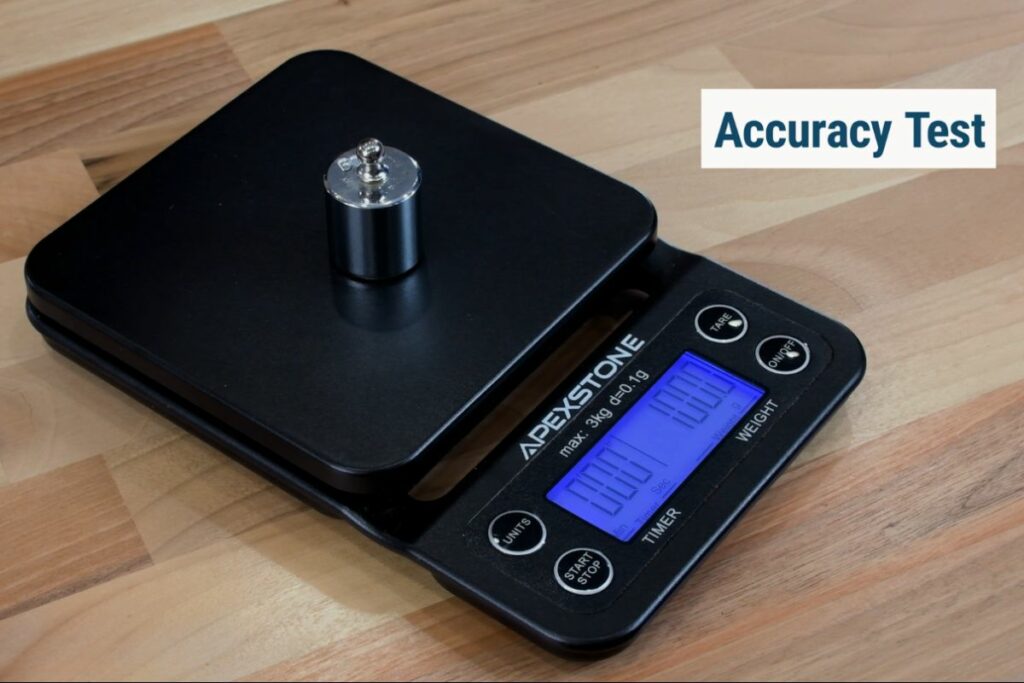
Note: You don’t really need a coffee scale that measures to 0.01 of a gram. These scales are mostly used for jewelry. Most home users never have to weigh more than 100 g to 200 g at a time in increments of .1 g. For example, you should measure about 20 g of ground coffee for espresso and around 60 g of coffee for filter coffee. This is why you don’t need a scale that measures from 0.01g to 2 kg, as you’ll likely never use these weights, but you’ll end up paying for a function you don’t need.
Overall, choose a digital coffee scale that’s accurate within .1 g. These are the best coffee scales that can measure coffee grounds accurately, so you have consistent espresso shots and brews.
Also, all the scales on this list are accurate. I tested different scales with a proper weight kit and found every scale tested 100 grams within 0.2 grams.
Responsiveness
Responsiveness means how long it takes the coffee scale to notice a change in weight. The better the response time, the more accurately you can brew. You can also think of this as the lag time on brewing.
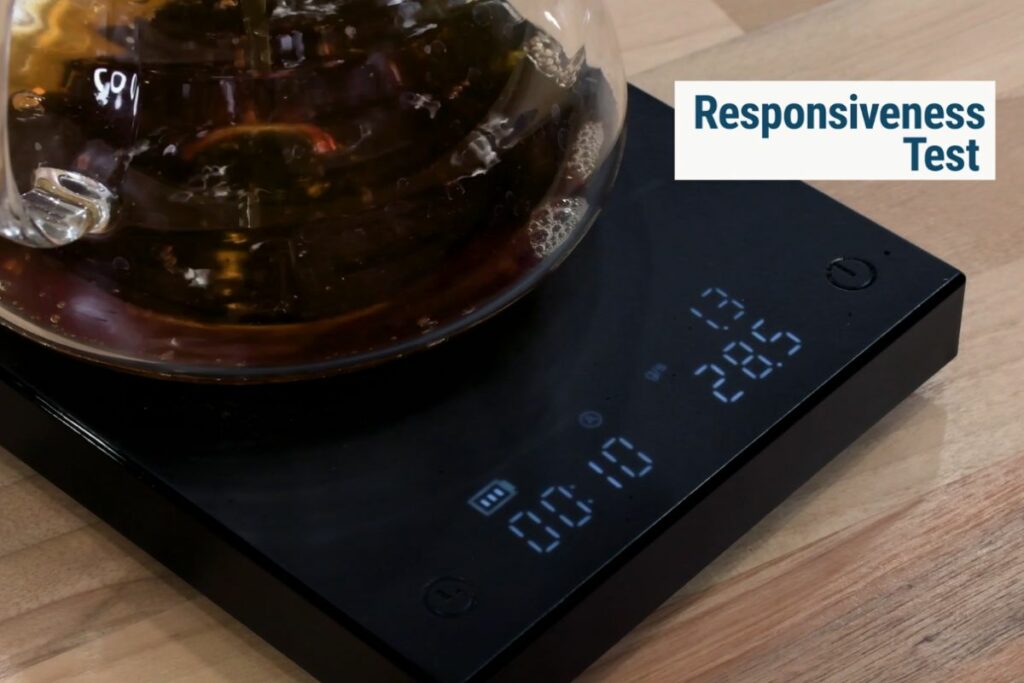
Responsiveness is more important for espresso than other coffee brewing methods. For example, if you use a scale that has a response lag, it means you’ll end up with a couple more espresso ml than you thought when you stopped the shot. That can easily mean the difference between a nice extraction and a somewhat bitter shot.
Responsiveness matters for pour over brewing as well. You want to hit a proper ratio, and you can easily go over by 3-5 grams on a scale with poor lag. A quick read makes weighing out the initial beans easier too.
Here’s a range of responsiveness, measured in grams change on scale after stopping the pour:
- Acaia Pearl: 0.2 grams
- Timemore Black Mirror: 0.5 grams
- Apexstone: 2.0 grams
Out of all the coffee scales on this list, the Acaia Pearl shines regarding responsiveness. It immediately detects changes in weight, and there’s no jumping between the numbers.
That being said, you get used to pretty much any scale. For example, the Apexstone jumps 2 grams, but I learned to stop a bit early to get an accurate pour.
Size and Design
Coffee scales come in various sizes, and the size is important because it determines which brewing method fits. Choose a scale that fits your favorite coffee maker.
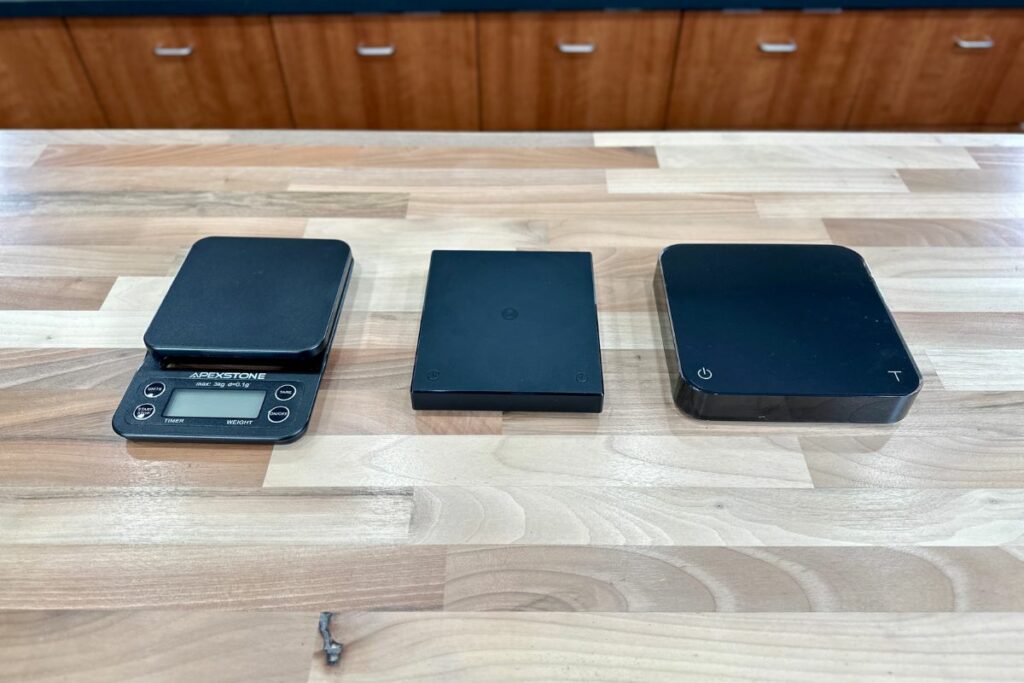
For example, if you mostly drink espresso, you need a small coffee scale that fits onto the drip tray (the Weightman is great here). But, if you make coffee with a Chemex, you need a larger and sturdier scale that can hold a Chemex and still be able to read the screen.
Also, if you travel a lot and need a scale that can be used on the go, you should choose a small and durable scale that can withstand bumps on the road.
In terms of design, there’s a lot to choose from as well. For example, Acaia coffee scales look like they were designed by Apple and are extremely stylish. Then, some scales are built as a one-piece, such as the Timemore, but others have a separate control pad, such as the Apexstone. Timemore is extremely sensitive, and if you touch its sides, it can throw off the measurements. Other scales aren’t as sensitive, and this wouldn’t happen with the Apexstone. Overall, think about if you want a scale that’s built as one solid piece or a scale with a separate display.
Other Special Features
Here are a few other features to think about when choosing a coffee scale:
- Built-in timer — A built-in timer lets you time the brewing process from the moment you pour water over the coffee grounds to the extraction or from the moment your espresso machine starts pouring until it stops. Keeping track of the brewing time can help you make changes to the brew, perfect your technique, and get a better cup. Overall, a built-in timer makes life easier and helps you experiment.
- Auto-off — Some coffee scales have an automatic auto-off function that kicks in after a few minutes of inactivity. This is a handy feature, especially if the coffee scale runs on batteries, as it means a longer life. However, not all scales have this feature, especially those at the lower price point.
- Water-resistant build — Coffee brewing means a lot of hot water around the scale, so a water-resistant scale is a smart choice. I’d especially recommend this if you use the scale for a pour-over or a French press. It’s one less thing to worry about.
- Bluetooth connectivity — Bluetooth connectivity means you can track the brew via apps, find and save recipes, and even connect with other coffee lovers. Smart scales can train you to have a certain flow rate and let you choose between different modes. However, this isn’t something most users care about, nor is it a big help when brewing coffee. I don’t think smart connectivity justifies the high price these scales have.
- Batteries — You can choose between regular AAA batteries or rechargeable scales. Most cheaper scales are battery-powered, while mid to higher-priced ones tend to be rechargeable. With AAA batteries, there’s a risk of them running out, and then you have to hunt down replacement batteries. This also isn’t the most environmentally-friendly approach. Or, you can choose a scale with a charging port and re-charge as needed. Overall, if you’re a heavy user or an environmentalist, go for a rechargeable scale. Otherwise, you’ll probably be fine with AAA batteries.
What’s the Best Coffee Scale for You?
My vote for the best coffee scale goes to Timemore. It has excellent responsiveness, and the flow rate feature is nice. The Apexstone is also a good choice, especially if you don’t have a scale and are on a budget. It’ll do the job well. Finally, the Acaia Pearl is amazingly quick, but it’s hard to justify the extremely high price.
Now that we’ve sorted you on coffee scales, you also need a reliable grinder for your espresso machines. Check out our round-up of the best coffee grinders for espresso.

